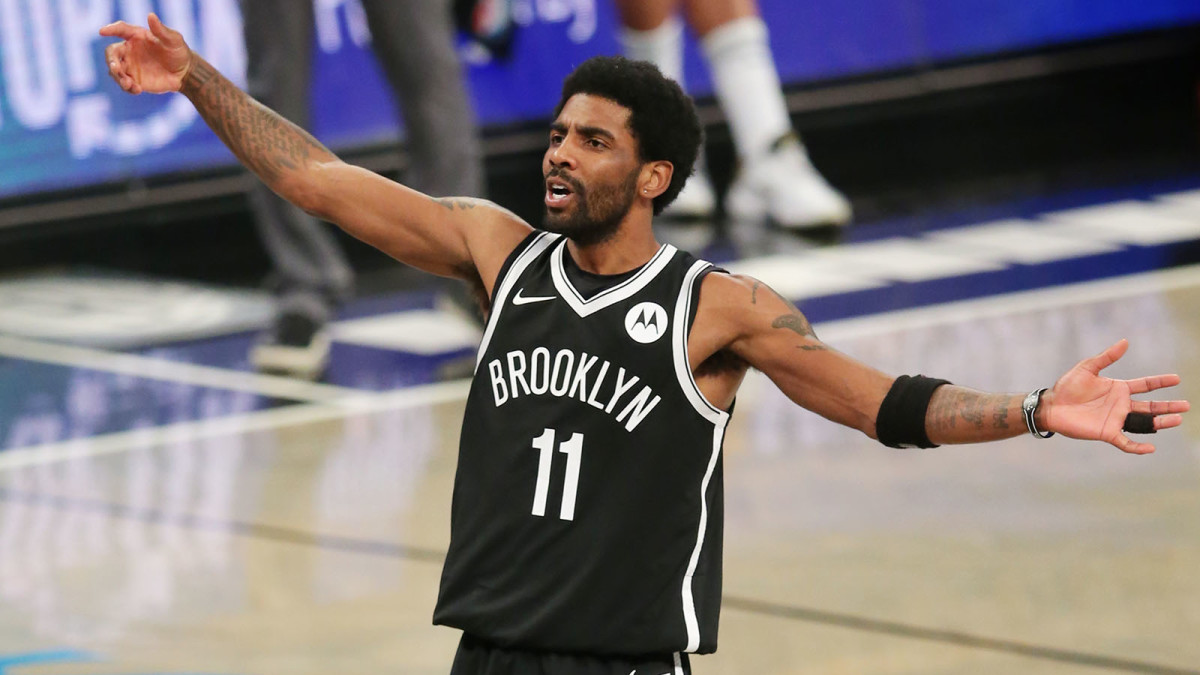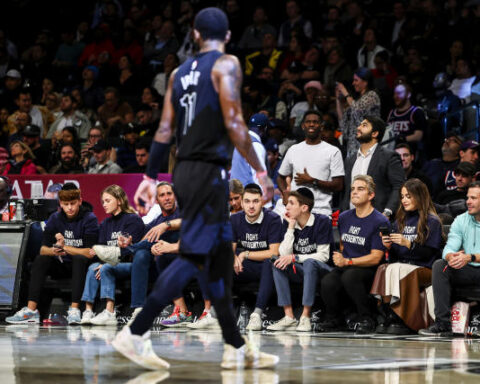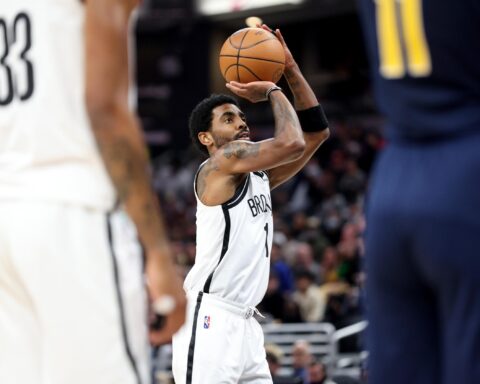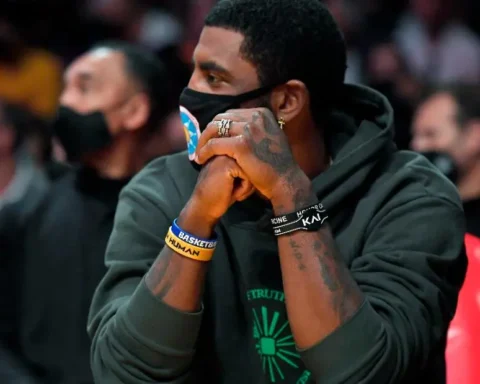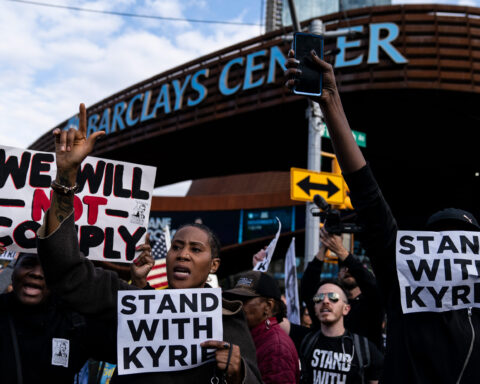For all foreseeable games and practices, the Brooklyn Nets will be without Kyrie Irving, an ace point guard known as much for his handles — some of the best, ever — as for the controversy he’s been brewing lately.
On Wednesday, Irving said that he isn’t vaccinated against Covid-19. This announcement came a day after the team’s general manager confirmed that the seven-time All-Star wouldn’t be permitted to begin play this season because of issues with his vaccination status.
Previously, Irving had refused to disclose his status. At NBA Media Day, he said that he “would like to keep all that private.” Keep all that private. In a league where about 95% of players are vaccinated against Covid-19, Irving is part of a very small but vocal group insistent on characterizing the shot not as a communal matter but as a personal one.
Irving later explained, “I am staying grounded in what I believe in. It is as simple as that. It is not about being anti-vax or about being on one side or the other. It is just really about being true to what feels good for me.”
So, what’s going on? Irving is among the players who are fierce advocates of racial justice — recall the NBA’s embrace of last year’s Black Lives Matter protests — but who are also reluctant to support a vaccine that combats a disease that disproportionately harms Black Americans. And while vaccinated, basketball phenom LeBron James and other players have echoed vaccine refusers’ flawed framing.
Last month, James confirmed that, despite initial skepticism of the vaccine, he had been inoculated against Covid-19. He said that he viewed his decision as “best suited for not only me but my family and my friends.”
But then, a turn: The Los Angeles Lakers star said that it wasn’t his place to influence others to get vaccinated.
“I don’t feel like, for me personally, that I should get involved in what other people should do for their bodies and livelihoods,” he said. “You have to do what’s best for you and your family.”
It’s worth underlining that players such as Irving aren’t being left unchallenged. Boston Celtics center Enes Kanter and basketball legend and civil rights activist Kareem Abdul-Jabbar have been some of the biggest critics of vaccine refusers.
Crucially, the players — the vaccinated as well as the unvaccinated — have a duty to defend something bound up with their teammates’ health.
“The players have a responsibility to protect the product, because they’re in a financial partnership with the NBA,” The Atlantic’s Jemele Hill wrote in a trenchant piece. “By protecting one another, the players are also protecting the league that they’ve built.”
I spoke with Robert Fullilove, a professor of clinical sociomedical sciences at Columbia University, about personal choice, the paradox of racial justice champions’ hesitancy toward the vaccine and the importance of public health messaging.
The following conversation has been lightly edited for length and clarity.
When you hear famous Black people such as LeBron James make getting vaccinated against Covid-19 a matter of “personal choice,” what’s your reaction?
Well, that it’s very reflective of US culture. We’re very driven by the notion that the Constitution, above all things, endows you with certain rights that are very important for individual freedom. So, we privilege individual decision-making. We like the idea that we live in a country that maximizes your opportunities to exercise personal choice.
The only problem is, unlike what I see in Europe, especially in France, our individual identity runs counter to what we in public health want people to embrace, which is that you also are responsible for the health of your neighbor. You would get vaccinated not just for you, but for all of the ways that you protect others around you from the impact of Covid-19.
So, on the one hand, I applaud that they’re at least getting vaccinated. But because they are speaking to a large audience — and because they’re thought to be part of a larger community and representing it in really important ways — their failure to embrace the necessity of having a community part of their message really troubles me.
It’s easy for people outside the Black community to judge the players, but what do their statements say about an abiding lack of trust in the US government?
Leadership from within the ranks of the community is a very different issue when your agenda is, What can we do together to advance our rights in a nation that’s consistently opposed to our trying to get those rights, and has consistently demonstrated that it’s much more against us than for us?
The moment it appears as if you are endorsing something from the outside, that you are partnering with an untrusted and poorly understood government, you’re going to have a much more difficult sell, trying to get them to adopt that point of view.
I think that if you look at LeBron James, in particular, a good part of his early life was all about the struggles he had to make it in a world where he was a Black man without a college degree. And he had every right to believe that a good part of his struggle was that — structurally, in this country — people are always going to be against the advancement of a Black man. So with that as a perception that he knows is present in the community, it is ridiculously hard, I think, for somebody like him to say, Yeah, I’m going to endorse a government message. Because it runs counter, I think, to the narrative he has about his own history and his own progress in the US.
Do you think that there’s been a problem with public health messaging about the vaccine?
What I’ve observed is less about the public health messaging and more about problems related to getting tested or access to treatment in medically underserved communities, especially Black communities. We did a terrible job of making sure that testing was routinely available to the communities that were hardest hit. Those are the ones that typically have hospital and clinical settings that are far removed from the neighborhood. So, people showed up to get tested, had to wait in line and then were told, No, we’re not really making this available to you.
Harlem is a great example. They opened up a vaccine site early on on 116th Street in Harlem. Lines around the corner. What was the problem? The lines around the corner were all White people from the Upper West Side. The neighborhood residents weren’t really represented appropriately in that crowd. So, if you look at vaccines as following on the heels of what I would describe as widespread mismanagement of everything having to do with providing testing and medical care to the Black community, the minute vaccines came, people were very clearly reminded of all the struggles they had before. And they said, Why should I trust you now?
How do we combat the problems you just laid out?
We need to learn the lessons of our failure to communicate appropriately, of our failure to pay attention appropriately at the beginning of the pandemic. It is a case study on what to avoid the next time this happens.
I’m very clear that Covid-19 might very well be endemic, that we will have successive waves of this virus showing up with new variants for at least the foreseeable future. So, in the time between now — when we’re having a certain lull — and when we’re likely to see some version of it again, this is the time to do a better job of getting into communities, identifying all the things that worry people most about our handling of the pandemic thus far. And then we need to learn from those lessons and adjust accordingly.

